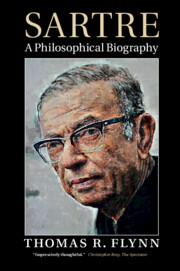Book contents
- Frontmatter
- Dedication
- Contents
- Preface
- Acknowledgments
- Abbreviations
- 1 The childhood of a genius
- 2 An elite education: student, author, soldier, teacher
- 3 Teaching in the lycée, 1931–1939
- 4 First triumph: The Imagination
- 5 Consciousness as imagination
- 6 The necessity of contingency: Nausea
- 7 The war years, 1939–1944
- 8 Bad faith in human life: Being and Nothingness
- 9 Existentialism: the fruit of liberation
- 10 Ends and means: existential ethics
- 11 Means and ends: political existentialism
- 12 A theory of history: Search for a Method
- 13 Individuals and groups: Critique of Dialectical Reason
- 14 A second ethics?
- 15 Existential biography: Flaubert and others
- Conclusion: the Sartrean imaginary, chastened but indomitable
- Select bibliography
- Index
- References
15 - Existential biography: Flaubert and others
Published online by Cambridge University Press: 18 December 2014
- Frontmatter
- Dedication
- Contents
- Preface
- Acknowledgments
- Abbreviations
- 1 The childhood of a genius
- 2 An elite education: student, author, soldier, teacher
- 3 Teaching in the lycée, 1931–1939
- 4 First triumph: The Imagination
- 5 Consciousness as imagination
- 6 The necessity of contingency: Nausea
- 7 The war years, 1939–1944
- 8 Bad faith in human life: Being and Nothingness
- 9 Existentialism: the fruit of liberation
- 10 Ends and means: existential ethics
- 11 Means and ends: political existentialism
- 12 A theory of history: Search for a Method
- 13 Individuals and groups: Critique of Dialectical Reason
- 14 A second ethics?
- 15 Existential biography: Flaubert and others
- Conclusion: the Sartrean imaginary, chastened but indomitable
- Select bibliography
- Index
- References
Summary
Toward the end of his biography of Jean Genet, Sartre pauses to issue the following warning to anyone considering a similar task:
In a good critical work, we will find a good deal of information about the author who is being criticized and some information about the critic. The latter, moreover, is so obscure and blurred that it has to be interpreted in the light of all that we know about him.
Sartre’s caveat to the contrary notwithstanding, his critical biographies yield a considerable amount of information about the critic himself. Still, his caution that a necessary condition for avoiding the “obscurity and blur” of this information is that it be interpreted in the light of all that we know about him invokes an ideal that is clearly impossible to attain. Of course, the caution is Hegelian in tone: anything less than the whole truth is false. Without venturing along that dark path, let us be satisfied with the insights, less than complete but cumulatively informative, that the previous chapters afford us as we begin to read Sartre’s interpretation of three giants of nineteenth-century French literature. Our goal is to “totalize” these studies and the earlier chapters, in our reading of his massive Flaubert “biography” as a summation of his metaphysical, aesthetic, political and ethical pursuits described and analyzed in the previous chapters.
- Type
- Chapter
- Information
- SartreA Philosophical Biography, pp. 382 - 408Publisher: Cambridge University PressPrint publication year: 2014

